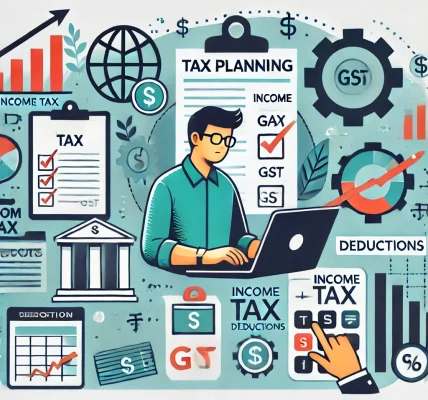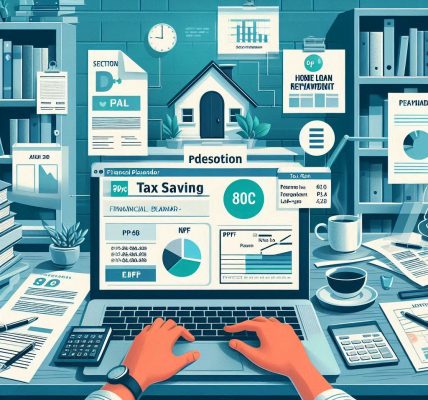Introduction
When it comes to tax planning, most individuals primarily rely on Section 80C deductions, which include popular investments like EPF, PPF, life insurance premiums, and ELSS mutual funds. However, Section 80C has a cap of Rs. 1.5 lakh per financial year, which limits tax-saving opportunities. Smart investors know that tax planning doesn’t stop at 80C. There are several other legal and effective ways to minimize your tax liability while growing your wealth.
This DIY guide will explore hidden tax-saving investments beyond 80C that can help you maximize deductions, enhance savings, and make informed financial decisions.
1. National Pension System (NPS) – Section 80CCD(1B)
Why NPS? The National Pension System (NPS) is a government-backed retirement savings scheme that offers an additional tax deduction beyond 80C.
- Tax Benefit: Additional deduction of Rs. 50,000 under Section 80CCD(1B).
- Who Can Invest? Any salaried or self-employed individual.
- Withdrawal Taxation: Partial withdrawal is tax-free, and up to 60% of the corpus is tax-free at maturity.
- Best for: Long-term wealth accumulation and retirement planning.
2. Health Insurance Premiums – Section 80D
Why Health Insurance? Medical expenses can be financially draining. Health insurance not only provides a safety net but also offers tax savings.
- Tax Benefit:
- Up to Rs. 25,000 for self, spouse, and children.
- Additional Rs. 50,000 for senior citizen parents.
- Who Can Claim? Any taxpayer purchasing health insurance for self or family.
- Best for: Financial protection against medical emergencies.
3. Home Loan Interest – Section 24(b) & 80EEA
Why Home Loans? Owning a house can lead to significant tax savings if planned wisely.
- Tax Benefits:
- Deduction of up to Rs. 2 lakh on home loan interest under Section 24(b).
- First-time buyers can claim an additional Rs. 1.5 lakh deduction under Section 80EEA (conditions apply).
- Best for: Individuals planning to buy a home.
4. Education Loan Interest – Section 80E
Why Education Loans? Higher education can be expensive, but the interest paid on education loans can help reduce taxable income.
- Tax Benefit: 100% deduction of interest paid, with no upper limit.
- Who Can Claim? Individuals who take an education loan for themselves, spouses, or children.
- Best for: Those pursuing higher education or financing a child’s education.
5. Donations to Charity – Section 80G
Why Donations? Supporting a good cause not only benefits society but also provides tax relief.
- Tax Benefit:
- 50% to 100% deduction, depending on the charity’s eligibility.
- Digital payments and bank transfers are mandatory for claiming deductions.
- Best for: Individuals who contribute to eligible charities and non-profit organizations.
6. Savings Account & Fixed Deposits for Senior Citizens – Section 80TTB
Why This Matters? Senior citizens have an extra tax-saving avenue through interest earned on savings accounts and fixed deposits.
- Tax Benefit: Deduction of up to Rs. 50,000 on interest income.
- Who Can Claim? Senior citizens (aged 60+).
- Best for: Retirees looking for safe investments with tax advantages.
7. Rental Income Deductions – Section 24(a)
Why Rental Income Optimization? If you own a property that is rented out, you can claim deductions on certain expenses.
- Tax Benefit: Deduction of 30% of rental income for maintenance and repairs (standard deduction).
- Who Can Claim? Property owners earning rental income.
- Best for: Individuals with additional rental properties.
8. Agricultural Income – Section 10(1)
Why Agricultural Income? Certain agricultural income sources are fully tax-exempt, providing a great legal tax-saving opportunity.
- Tax Benefit: 100% exemption on qualifying agricultural income.
- Who Can Claim? Farmers and individuals earning from agriculture-based activities.
- Best for: Landowners and agricultural entrepreneurs.
9. Employer Benefits – Meal Coupons, LTA, and Gratuity
Why Utilize Employer Benefits? Salaried employees can reduce taxable income by opting for specific perks.
- Tax Benefit:
- Meal coupons (up to Rs. 50 per meal) are tax-free.
- Leave Travel Allowance (LTA) covers travel expenses twice in four years.
- Gratuity received after 5 years of service is partially or fully tax-exempt.
- Best for: Salaried employees looking for additional tax benefits.
10. Capital Gains Exemptions – Section 54, 54EC, 54F
Why Capital Gains Planning? If you’ve sold property, stocks, or other assets, capital gains tax can be reduced using exemptions.
- Tax Benefit:
- Section 54: Exemption on capital gains from selling a residential house if reinvested in another property.
- Section 54EC: Investment in NHAI/REC bonds exempts long-term capital gains (limit: Rs. 50 lakh).
- Section 54F: Sale proceeds from other assets (not house property) can be reinvested in real estate for exemption.
- Best for: Investors and homeowners looking to reduce capital gains tax.
Conclusion
Tax planning is not just about Section 80C; it’s about exploring multiple deductions to legally reduce your tax liability. The key is to stay informed, diversify investments, and claim the right deductions while ensuring compliance with tax laws.
Before making any financial decisions, consult a tax expert or financial advisor to maximize your benefits while staying within legal boundaries.




